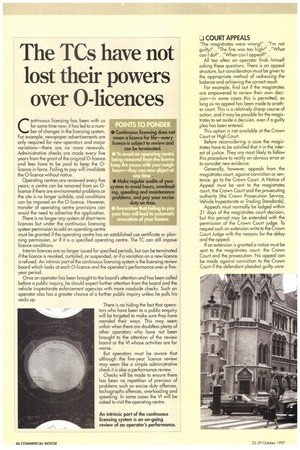The TCs have not lost their powers over 0-licences
Page 48

If you've noticed an error in this article please click here to report it so we can fix it.
Continuous licensing has been with us for some time now; it has led to a number of changes in the licensing system. For example, newspaper advertisements are only required for new operators and major variations—there are no more renewals. Administrative checks are made every five years from the grant of the original 0-licence and fees have to be paid to keep the 0licence in force. Failing to pay will invalidate the 0-licence without notice.
Operating centres are reviewed every five years; a centre can be removed from an 0licence if there are environmental problems or the site is no longer suitable, and conditions can be imposed on the 0-licence. However, transfer of operating centre provisions can avoid the need to advertise the application.
There is no longer any system of short-term licences but under the continuous licensing system permission to add an operating centre must be granted if the operating centre has an established use certificate or planning permission, or if it is a specified operating centre, The IC can still impose licence conditions,
Interim licences are no longer issued for specified periods, but can be terminated if the licence is revoked, curtailed, or suspended, or if a variation on a new licence is refused. An intrinsic part of the continuous licensing system is the licensing review board which looks at each 0-licence and the operator's performance over a fiveyear period. Once an operator has been brought to the board's attention and has been called before a public inquiry, he should expect further attention from the board and the vehicle inspectorate enforcement agencies with more roadside checks. Such an operator also has a greater chance of a further public inquiry unless he pulls his socks up.
There is no hiding the fact that opera_■11 tors who have been to a public enquiry will be targeted to make sure they have mended their ways. This may seem unfair when there are doubtless plenty of other operators who have not been brought to the attention of the review board or the VI whose activities are far worse.
But operators must be aware that although the five-year licence review may seem like a simple administrative check it is also a performance review.
Checks will be made to ensure there has been no repetition of previous of problems such as excise duty offences, tachographs offences, overloading and speeding. In some cases the VI will be asked to visit the operating centre.
_1 COURT APPEALS
"The magistrates were wrong!"..."I'm not guilt/!"..."The fine was too high!" ..'What can I do?"..."When can I appeal?"... All too often an operator finds himself asking these questions. There is an appeal structure, but consideration must be given to the appropriate method of redressing the balance and achieving the correct result. For example, find out if the magistrates are empowered to review their own decision—in some cases this is permitted, as long as no appeal has been made to another court. This is a relatively cheap course of action, and it may be possible for the magistrates to set aside a decision, even if a guilty plea has been entered. This option is not available at the Crown Court or High Court, Before reconsidering a case the magistrates have to be satisfied that it in the interest of justice. They are most likely to follow this procedure to rectify an obvious error or to consider new evidence.
Generally, however, appeals from the magistrates court, against conviction or sentence, go to the Crown Court, A Notice of Appeal must be sent to the magistrates court, the Crown Court and the prosecuting authority (the Crown Prosecution Service, Vehicle Inspectorate or Trading Standards). Appeals must normally be lodged within 21 days of the magistrates court decision, but this period may be extended with the permission of the Crown Court judge. To request such an extension write to the Crown Court Judge with the reasons for the delay and the appeal. an extension is granted a notice must be sent to the magistrates court, the Crown Court and the prosecution. No appeal can be made against conviction to the Crown Court if the (defendant pleaded guilty unre
















































































































